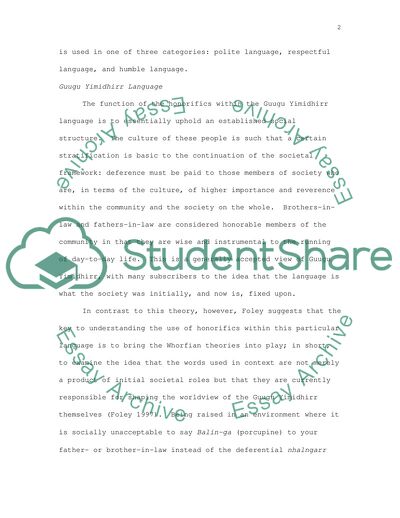
- Home
- Free Samples
- Premium Essays
- Editing Services
- Extra Tools
- Essay Writing Help
- About Us
- Studentshare
- Subjects
- Miscellaneous
- The specialbrother-in-law language style of Guugu Yimidhirr,which Haviland describes, is similar in many ways to the politeness and respect language styles of
The specialbrother-in-law language style of Guugu Yimidhirr,which Haviland describes, is similar in many ways to the politeness and respect language styles of - Essay Example

- Subject: Miscellaneous
- Type: Essay
- Level: Ph.D.
- Pages: 4 (1000 words)
- Downloads: 0
- Author: tcrooks
Extract of sample "The specialbrother-in-law language style of Guugu Yimidhirr,which Haviland describes, is similar in many ways to the politeness and respect language styles of"
In particular, the honorific system requires the use of deference words and tone to a brother-in-law or father-in-law. Although the English language has largely eradicated its honorific system except in cases of traditional events such as courts of law or within the presence of a monarch, the Guugu Yimidhirr language does have similarities with the modern Japanese language. Although Japanese speakers do not use specific deference words in terms of brothers-in-law or fathers-in-law, they do employ a system of deference to their speech that is used in one of three categories: polite language, respectful language, and humble language.
The function of the honorifics within the Guugu Yimidhirr language is to essentially uphold an established social structure. The culture of these people is such that a certain stratification is basic to the continuation of the societal framework: deference must be paid to those members of society who are, in terms of the culture, of higher importance and reverence within the community and the society on the whole. Brothers-in-law and fathers-in-law are considered honorable members of the community in that they are wise and instrumental to the running of day-to-day life.
This is a generally accepted view of Guugu Yimidhirr, with many subscribers to the idea that the language is what the society was initially, and now is, fixed upon. In contrast to this theory, however, Foley suggests that the key to understanding the use of honorifics within this particular language is to bring the Whorfian theories into play; in short, to examine the idea that the words used in context are not merely a product of initial societal roles but that they are currently responsible for shaping the worldview of the Guugu Yimidhirr themselves (Foley 1997).
Being raised in an environment where it is socially unacceptable to say Balin-ga (porcupine) to your father- or brother-in-law instead of the deferential nhalngarr (Shopen 1979) means that children
...Download file to see next pages Read MoreCHECK THESE SAMPLES OF The specialbrother-in-law language style of Guugu Yimidhirr,which Haviland describes, is similar in many ways to the politeness and respect language styles of
Language: Phrase Styles
The History of Politeness in the English Language
Gender and Politeness in an ESL Language Academic Context
Honorifics Similarities of the Guugu Yimidhirr and Japanese Languages
Chinese is similar in many ways to the politeness and respect language styles of Japanese
Learning New Languages: A Guide to Second Language Acquisition Book
Javanese Politeness
Specialist Language Style of Science

- TERMS & CONDITIONS
- PRIVACY POLICY
- COOKIES POLICY